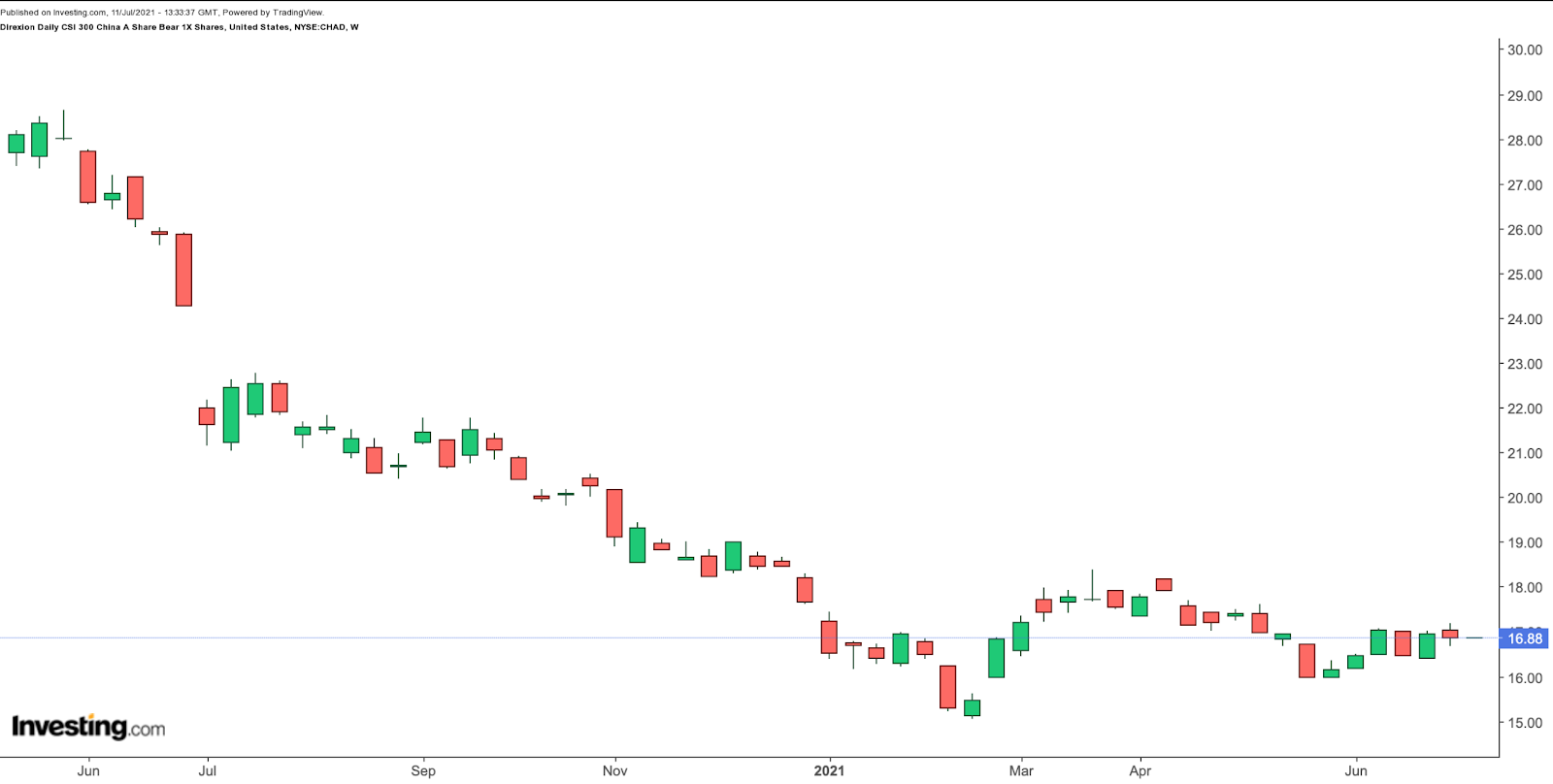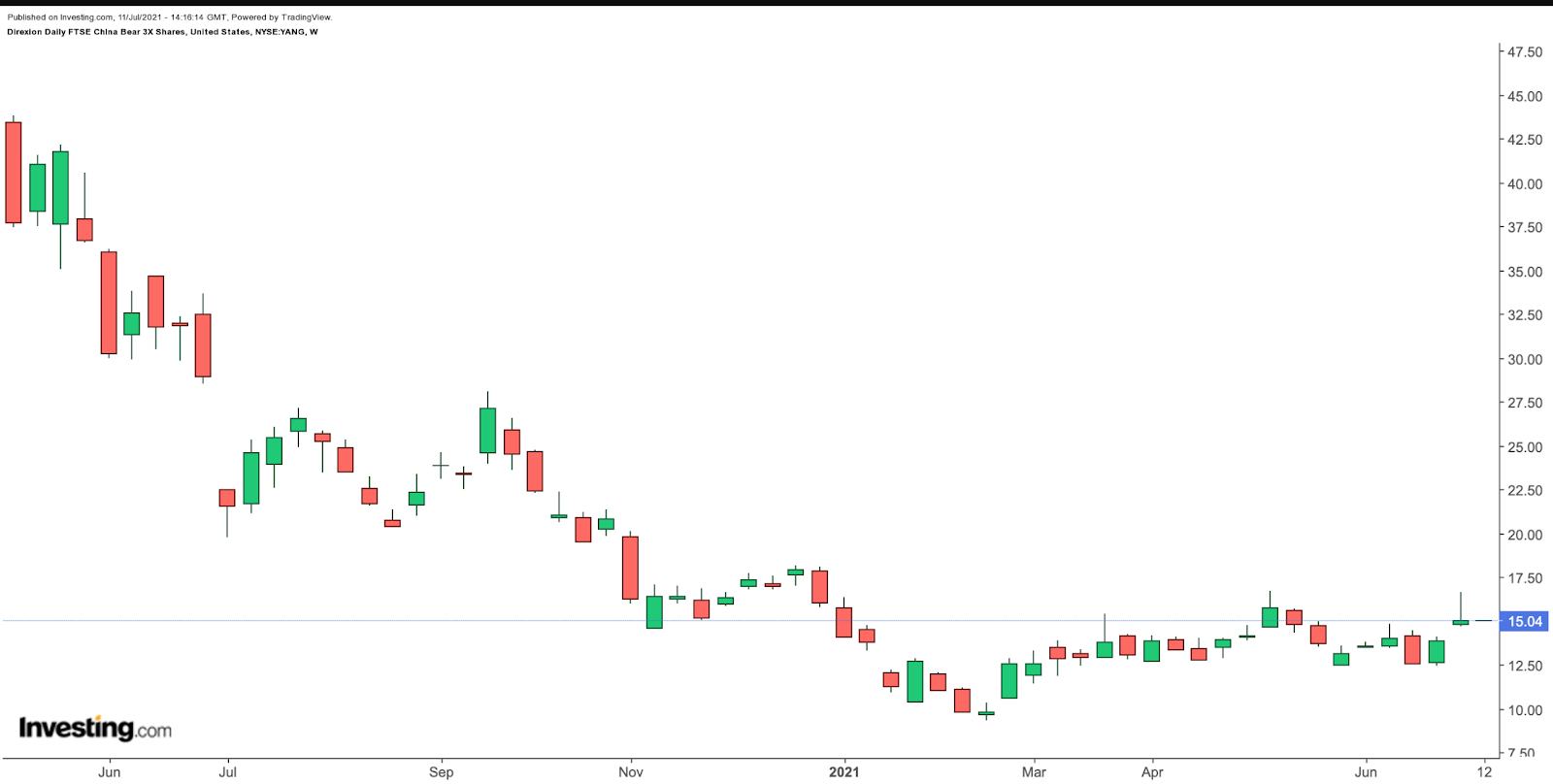Equities in China, the world's second-largest economy behind the US, have been making headlines. Regulators in the Asian nation have been targeting tech names that are, or plan to be, listed overseas. Most recently, following tighter regulation by the Cyberspace Administration of China (CAC), shares of the ride-hailing company Didi Global (NYSE:DIDI) have come under pressure.
On June 30, Didi had its initial public offering (IPO) in the US. The stock opened at $16.65 and reached a high of $18.01 the same day. However, by July 8, the shares were down to $11 and are now hovering at $12.
Raising capital overseas has been gaining momentum among many Chinese businesses. But Beijing's restrictive stance has led to investor unease and declines in many China-headquartered stocks on Wall Street.
Several widely-followed exchange-traded funds (ETFs) that focus on China have also been adversely affected. They include:
- Invesco China Technology ETF (NYSE:CQQQ): down 4.3% year-to-date (YTD) and down about 5.8% so far in July;
- Global X MSCI China Consumer Disc ETF (NYSE:CHIQ): down 6.5% YTD and down 5.7% in July (covered here);
- KraneShares CSI China Internet ETF (NYSE:KWEB): down 18.4% YTD and down 10.3% in July (covered here).
Meanwhile, the SZSE Composite index returned about 4.6% YTD, and the Shanghai Composite is up 2.1 % YTD. Despite their moderately positive performance in 2021, both indices have been choppy in the past few weeks.
As the risk premium for investing in Chinese businesses, especially in the tech sector, increases, many investors wonder how they can protect their current holdings of Chinese stocks. Given the policy uncertainty, others might want to benefit from further declines in those shares. One possibility could be to put together an options-based strategy to protect their existing stock of ETF holdings and hedge against a fall in price in the near future.
Other readers, especially short-term traders, could consider buying an inverse ETF, a topic we have covered in detail before. Such a move could be regarded as a tactical trading alternative to selling an existing stock or fund position. Today, we'll briefly discuss such two inverse ETFs.
1. Direxion Daily CSI 300 China A Share Bear 1X Shares
- Current Price: $16.88
- 52-Week Range: $15.05 - $22.77
- Expense Ratio: 0.85% per year
The Direxion Daily CSI 300 China A Share Bear 1X Shares (NYSE:CHAD) seeks to achieve daily investment results of 100% of the inverse (or opposite) of the performance of the CSI 300 index. Put another way, CHAD is set up to move in the opposite direction of this benchmark on a daily basis. The fund started trading in June 2015, and has about $127 million under management.
The CSI 300 index is a modified free-float market capitalization (cap) weighted index. It is made up of the most liquid and largest shares in the Chinese A-share market.
Many of our readers might already know that China A-shares are renminbi (RMB)-denominated equity shares of China-headquartered firms that trade on the Shanghai and Shenzhen Stock Exchanges. They are also known as domestic shares.The leading 10 stocks comprise about 25% of the index.
Among them are Kweichow Moutai (SS:600519), China Merchants Bank (SS:600036), Wuliangye Yibin (SZ:000858) and Gree Electric Appliances Inc of Zhuhai (SZ:000651).
In the past year, the CSI 300 Index is up about 6.7%. However, the CHAD ETF is down almost 22%. This difference in returns is a strong reminder of how such inverse funds are mostly appropriate for short-term traders.
2. Direxion Daily FTSE China Bear 3X Shares
- Current Price: $15.04
- 52-Week Range: $9.34 - $28.06
- Expense Ratio: 1.07% per year
The Direxion Daily FTSE China Bear 3X Shares (NYSE:YANG) is a leveraged ETF. It seek daily investment results of 300% of the inverse of the performance of the FTSE China 50. This index comprises the 50 largest and most liquid public Chinese businesses listed on the Hong Kong Stock Exchange. YANG started trading in December 2009, and assets under management are close to $36 million.
The top ten names in the FTSE China 50 Index make up over 55% of the holdings. Tech giants and internet platforms including Alibaba (NYSE:BABA), JD.com (NASDAQ:JD)), Meituan (OTC:MPNGY), Tencent (OTC:TCEHY) and NetEase (NASDAQ:NTES) are among the leading stocks in the index. These names and many of their peers have come under pressure in recent days.
Over the past 52 weeks, the FTSE China 50 Index is down 1.6%. On the other hand, YANG has lost over 30% of its value. Experienced traders who continue to be bearish on these tech businesses could find short-term opportunity in YANG.
